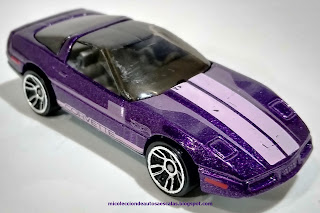Este es un blog de fotografías para la colección personal de autos de diferentes escalas.
Tuesday, July 7, 2009
1966 Volkswagen Karmann Ghia 1:18 Road Legends
Sunday, June 28, 2009
1983 Chevrolet Corvette C4 1:64 Hot Wheels
From Wikipedia:
Sunday, June 21, 2009
2008 Opel GT Maisto 1:24
The Opel GT is a front-engine, rear-drive two-seat sports car manufactured and marketed by Opel in two generations — separated by a 34-year hiatus.
The first generation Opel GT (1968 -1973) debuted as a styling exercise in 1965 at the Paris and Frankfurt motor shows. The production vehicle used mechanical components from the contemporary Opel Kadett B and two-door hard top bodywork by French contractor Brissonneau & Lotz. The styling of the GT was often cited as similar to the 1968 Chevrolet Corvette which went on sale in September 1967.
Opel marketed a second generation GT (2007-2009) as a rebadged variant of the Saturn Sky/Pontiac Solstice two-seater convertible, manufactured in Wilmington, Delaware, USA.
In 2016, Opel introduced the GT Concept at the 2016 Geneva Motor Show as a lightweight, turbocharged, rear-wheel drive two-seater.Sunday, June 14, 2009
Mercedes Benz SLR McLaren 1:24 Motormax
The Mercedes-Benz SLR McLaren (C199 / R199 / Z199) is a grand tourer jointly developed by German automotive manufacturer Mercedes-Benz and British automobile manufacturer McLaren Automotive and sold from 2003 to 2009. When the car was developed, Mercedes-Benz owned 40 percent of the McLaren Group and the car was produced in conjunction between the two companies. SLR is an abbreviation for "Sport Leicht Rennsport" (Sport Light Racing), a homage to the Mercedes-Benz 300 SLR which served as the car's inspiration. The car was offered in coupé, roadster and speedster bodystyles with the latter being a limited edition model.























































